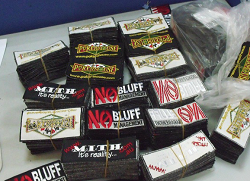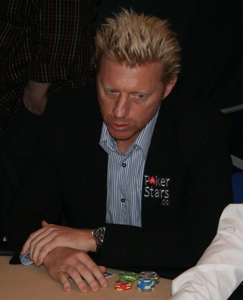 |
| The end of the poker patch? |
Poker is changing dramatically right now - the game is getting regulated, social media is finally starting to come into the picture, and every poker room is looking at ways in which to make the poker economy healthier.
We had a fantastic blog this week from our CEO, Dominik Kofert, on his vision for the future of poker, in which he envisions a future where poker is marketed as a hobby and entertainment, rather than a sport or career.
Many poker rooms are introducing initiatives that penalize winning players, or at least, reward recreational players more. Elsewhere, many of the former "heroes" of poker are dramatically falling from grace, in particular, those embroiled in the Full Tilt scandal.
For whatever reason, the high profile professional player is no longer the centre of the poker universe.
Which compels me to ask, what is the point of poker rooms sponsoring players anymore? We are constantly hearing about the profits of poker rooms declining year on year, yet many rooms still insist on investing heavily on sponsoring players to wear their patch for them at tournaments.
What do sponsored players bring to a poker room?
 |
| The Hendon Mob were early pioneers of poker sponsorship |
What actual value is derived from sponsoring someone to play poker? There are a handful of players out there who could, in 2012, possibly influence someone to play on a site by representing it - the likes of Daniel Negreanu, Tony G, Phil Hellmuth, Phil Ivey, Doyle Brunson - and that list is decreasing all the time. Not many other poker players have a genuine fan-base like this, or what we can really call "star power".
Beyond the players who are regularly on TV and are actually well known by the mainstream audience, what actual value do the vast majority of "I-won-an-EPT-sponsored-players" bring to the table?
They don't attract new players to the game, because most of them are complete nobodies outside of poker, so they could be anyone to a non poker player watching them on TV.
Likewise, what value do they have to existing poker players? The chances are that anyone who has been playing poker for a while has already made their choices where to play, based on software, softness, VIP deals, traffic etc. If, all of a sudden, sponsored player X takes down the next leg of the WPT, I may find that interesting, but it will not in any way influence where I decide to play poker.
As a player, I am much more interested in the things I have mentioned above that concerned me. If I am going to switch poker rooms, or play more on an existing one, it is going to be increased rakeback, bigger guarantees, softer games, better promotions, or improved software that will do it.
The Black Friday effect
 |
| Could the FTP sponsorship model ever be sustainable again? |
We want our rake going back into promotions, software, rakeback, and marketing to bring new players to the table. I feel it was going this way anyway before Black Friday, but the perception of sponsored players by the poker community in the future will probably be "why is that guy playing with our money?" - and after the whole Full Tilt debacle, can you blame us?
I think part of the widespread acceptance of sponsorship in the past was probably down to a flawed sense of deserving. Sponsored players were perceived as being accomplished, talented and hard-working; we didn't question why they got to play on our dime, because we felt their superior poker abilities meant they deserved to wear the patch.
This just does not wash anymore. The integrity of poker players is being scrutinised more than ever, no longer are they worshipped or idolised. Many former heroes have become villains since Black Friday, especially the ones who are thought to have benefited at the expense of all the players with money stuck on Full Tilt.
Full Tilt's entire model was built around sponsored players, their hook-line was "play with the pros" after all, and when they went down, there were about 250 sponsored players on their books. When you consider many of the traditional sponsorship deals are worth in the region of $100k a year, is there any wonder the site imploded like it did with figures like that?
In 2012, the only real benefactors from the traditional poker sponsorship model is the sponsored players themselves. I hope that the community would never stand for another sponsorship model like FTP's again, and instead urged poker rooms to put more of our rake into the things that bring new players to the tables, and our own experience much more enjoyable.
Finally, before I receive a sackful of hate mail and angry tweets from the hundreds of sponsored players out there - I will be following this up with a second part, which will focus on the sponsorship deals that still have value in 2012.
Part 2
 |
| Celebrity poker players bring star power to the table |
Today I would like to focus on some areas of sponsorship that still have value. I still think in some of cases, the money could be better used elsewhere; but these are by no means a waste, or at least, are much better than others.
One of the main reasons for my attack on the current state of player sponsorships was that most of the sponsored players do not actually have the star power to encourage new players to take up the game, or existing players to play more/switch rooms. The vast majority of well known poker players are still complete nobodies to the rest of the world.
The obvious exception here are the sponsored players who are already celebrities. The rich and famous folks from the world of sports and showbiz, who have achieved the holy grail of poker sponsorship without actually having to back it up with poker ability.
It may suck that a hard working grinder with some real success behind them struggles to find a sponsor, but Boris Becker can just show a slight interest in the game and land a PokerStars deal, but Boris will do so much more for PokerStars than most players ever could.
Ready made fan-bases
 |
| Liv Boeree is a sponsor's dream |
Celebrities also make it onto TV, and into newspapers, on a regular basis. Should they make it onto said TV or newspapers wearing a poker logo, that is worth much more than a regular sponsored player taking down a WPT event.
I always pose this question when weighing up the relative worth of a sponsored player. If you were to open a poker room tomorrow, who would you prefer to endorse your room: Phil Laak or Lady Gaga? If your answer is the Unabomber, you hate money.
You do not have to be world famous to have some sponsorship leverage as a poker player, but you do need to have an additional appeal beyond your ability to play cards. A great example of this is Liv Boeree, who is first and foremost a player, a very good one at that, but has several qualities that can bridge the gap between poker and mainstream appeal.
She is an attractive girl, which not only wins her fans it also gets her mainstream publicity. She has an great back story as an astro-physics student, which makes her interesting to write about. Finally, she is also a talented guitarist and heavy metal fan, which has seen her become something of a celebrity in rock music circles.
Then of course there are the handful of players who can genuinley be considered celebrities just from the world of poker. Players like Phil Hellmuth and Daniel Negreanu, and those who are famous in their home countries like ElkY and Joe Hachem. These guys are seen as the faces of poker, and have enough star power to deserve sponsorship on that reason alone.
Loyalty based sponsorship
 |
| Randy Lew is part of the new breed of sponsored players |
Many poker rooms have realised that there is much more merit to giving out their sponsorship deals to the guys who have helped fund the marketing budget in the first place. PokerStars, PartyPoker and PKR are all examples of rooms who have rewarded loyalty with sponsorship.
This model has a number of benefits. First of all, it cultivates a sense of loyalty and community at the room itself, the players can feel an affinity with the pro because he is one of us after all.
Secondly, it gives players of all levels something to aspire to, and gives them a reason to play (and rake) more. PokerStars, for example, did not just pick out the biggest profit winners for sponsorship, they also picked out low stakes players like chipstar1 and high raking grinders like nanonoko.
The third benefit is that the players will actively look to promote the poker room for free. I know lots of players who wear PokerStars or PKR patches at tournaments for free, simply because they really want to make it onto the sponsored team, and are working hard to prove they deserve it.
Finally, maybe the best reason to justify the deal in the first place is that they have already paid for part of it with their own activity at the tables. It is much easier to quantify the value of a newly sponsored pro when they have already raked most of what their deal is worth.
Ultimately the key to a valuable sponsorship deal in 2012 is to have a second appeal beyond your ability to play poker itself. Are you famous outside of poker? Are you an attractive woman? Do you appeal to a demographic that poker is trying to attract like women, video games, or regions where poker is less popular? Do you have a huge fan base on social media? Are you paying an immense amount of rake already?
There are still plenty of poker sponsorship models that add value to a poker room, there are still reasons why the community should be able to get behind a sponsored player without being bitter that their rake is paying for their free ride. But being sponsored simply because you are good at poker simply does not hold weight anymore in 2012.
by Barry Carter




2 comments:
Many poker rooms are introducing initiatives that penalize winning players, or at least, reward recreational players more. Elsewhere, many of the former "heroes" of poker are dramatically falling from grace, in particular, those embroiled in the Full Tilt scandal.
Bazza,
This was excellent piece of writing. In my short time in and around the poker industry I often wonder how savvy the business people are? Is anyone even analysing whether or not the sponsored pro actually earns money or loses money? If it were my industry I would know by the penny.
Ching.
Post a Comment